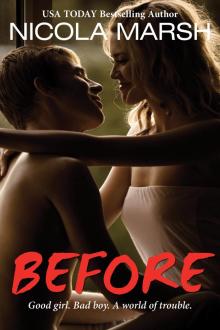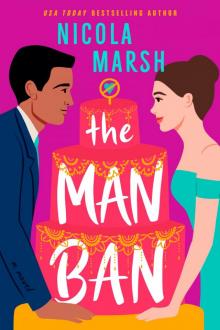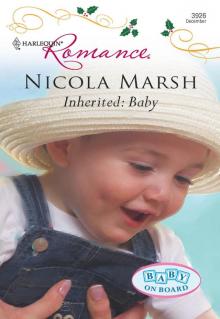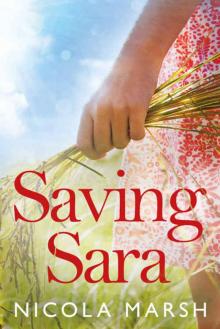- Home
- Nicola Marsh
The Boy Toy Page 18
The Boy Toy Read online
Page 18
He chuckled at her sarcasm. “I don’t want kids, never have, so this takes the pressure off with my gran. As for the platonic bit, we can work on that.”
She smiled. “You’re persistent, I’ll give you that.”
“No, I’m being a good friend.” He hesitated. “Seriously, Samira, I’m here for you. And while I’m confident you’ll work everything out, know that you can off-load to me whenever.”
“Thanks,” she murmured, touched by his support. “Means a lot.”
“Okay, I’ve got to go pick out wallpaper for the nursery and book Lamaze classes.”
She laughed as he’d intended, and it struck her how much lighter she felt by telling him everything.
“And don’t forget, you still owe me that lunch I didn’t get when I left you and Kushi to sort things out.”
“I’ll be in touch, okay? Because if Mom didn’t like the news about Rory, I have a feeling that learning she’s going to be a grandma may require a lot more ‘sorting out.’”
He chuckled. “Good luck. And take care.”
“Thanks, you too.”
She disconnected and placed the cell back on the bedside table. She would never enter another marriage not based on true love, but for a scant second, when she envisioned doing all this on her own versus having a supportive guy like Manny by her side, she’d been tempted.
Thirty-One
Fatherhood.
How could Rory contemplate being a dad when he didn’t know how?
Garth had been a lousy role model. All he’d learned from his father was how to be a harsh disciplinarian, not spend much time with your kid, and throw money at the problem. Way to go, Dad.
Not that Rory didn’t like kids. He did. After all, wasn’t he putting himself out there in the most terrifying way possible by hosting Renegades to help kids?
He liked hanging out with them at the housing commission flats. Kids had an inherent honesty, a bluntness he appreciated. He could relate because he had a low tolerance for bullshit. But spending time with other people’s kids and raising one of his own were worlds apart.
He’d been reeling when he left Samira’s apartment last night to the extent he hadn’t realized until an hour later he may not even be around for his kid. Samira would head back to LA at the end of her six-month stint at Pia’s health center, taking his child with her. It was in that moment of realization he felt something akin to regret.
He may not want to father a child for fear of passing on his speech impediment, but now it had happened, being a dad could grow on him.
Considering the way he’d handled the news, he wouldn’t blame Samira for not wanting him anywhere near their child. He’d been an idiot, his insecurities manifesting at the worst possible time. She didn’t know about his stutter or his fears of passing it on to a child, so she’d see him as a douche rather than a guy dealing with a bone-deep fear of giving his kid an impediment that dogged him to this day and he wouldn’t wish on anybody.
He should tell her the truth. But would it be fair, giving her one more thing to worry about? Their kid could be fine and speak fluently, so why burden her with his fears?
Once he got this obligatory visit with his dad out of the way, he’d call her. He needed to apologize and show his support.
As he trudged up the path, glancing at the well-kept garden, the trimmed hedges, the blossoming flowers, he had the same dread in his gut as every time he’d dragged his feet up this path after school each day.
His father’s mansion may appear immaculate on the outside, but it was all for show and, just like his dad, cold on the inside. He’d known kids at his snobby private school deigned to acknowledge his existence only because Garth Radcliffe was a highly regarded barrister in Melbourne and they knew he lived in an elite part of Brighton.
Though it didn’t stop them teasing him mercilessly, mocking his speech, even though he’d mastered a lot of techniques to control his stutter by the time he finished high school. The only place he’d shone was onstage, encouraged into acting by Amelia as a way to master his fears of speaking in front of others, but then the bullies had teased him for a different reason, labeling him effeminate and worse.
He hadn’t told his dad any of it. What would be the point, when Garth already saw him as a failure anyway? Not by his grades; the only time his dad vaguely looked at him with pride was twice a year, when the end of semester brought reports. Rory had always killed it with straight As because he had half a brain in his head, particularly for figures, and spent more time studying than most because he didn’t have any friends. His dad had been mighty impressed when he’d chosen to major in economics; less so when he turned his back on a lucrative career in business to tumble around a movie set instead.
As he rang the doorbell, Rory wondered what his dad would make of his impending fatherhood. Not that he’d tell him now, but he knew Garth would view it as yet another disappointment.
A housekeeper he didn’t recognize opened the door, a woman of about sixty wearing a plain black dress and her blond-turning-silver hair pulled back in a severe ponytail. “You must be Rory. I’m Bertha.”
“Nice to meet you. I’m here to see my dad.”
“He’s been called away on business, but he asked you to wait for him.” She opened the door wide. “Come in. Can I get you anything?”
“I’m fine,” he said, clamping down on a flash of indignation. Why hadn’t dear old dad sent a text or called him to let him know about the change of plans? They could’ve canceled this catch-up today and rescheduled. He hated having to wait around like his time wasn’t as important as his dad’s.
“I’m in the kitchen doing an online grocery order if you need anything,” she said, closing the door. “You know your way around.”
She left him standing in the marble-tiled hallway, feeling like a stranger in what had once been his home. Not that it felt like one. Too many pristine glass surfaces and shiny floors. He’d hated having to take his shoes off at the front door before he came in, in case a speck of mud dotted the floor. And that had been just one of the many rules he’d had to live by.
Always sit at the table for dinner, even if his dad never spoke to him. No screens after nine p.m., including TV, computer, cell, and laptop. No mixing with the scholarship kids. No social media profiles that could reflect badly on him. Lights out at ten, unless he had tests and had to study. No going out on school nights, which was ironic, as he’d have to have friends to do that. On and on, a long list he’d hated almost as much as the fraught silences whenever he was with his dad.
He often wondered why Garth didn’t ship him off to boarding school. Would’ve made their lives a hell of a lot easier. Instead, they’d coexisted in this mausoleum of a house, tolerating each other with frosty silences.
He paced the hallway a few times, tempted to slip away. He could text his dad with the same excuse Garth had used, “called away on business.” Glancing at his watch, he decided to give him another fifteen minutes before heading off.
He strolled into the library, a large room where his dad did the bulk of his work behind a monstrous mahogany desk, surrounded by floor-to-ceiling matching shelves filled with law texts and classics. No commercial fiction for Dad.
As always, whenever he entered this room, his gaze landed on the single framed photo on the wall near the door, the only space not covered by a bookshelf. It must’ve been taken when he was about one. His mom held him, and his parents were both resting their heads against his, wearing matching doting smiles.
After his mom left, this photo had given him hope: that she’d come back, that she still loved him despite her absence, that his dad actually cared. But as the years went by, she never returned and his father grew more taciturn, leaving him to resent the faux image of a happy family.
However, seeing the photo now made a tiny bud of hope unfurl in his chest. Maybe he could be a goo
d dad, one who looked at his kid like that until he was old?
Buoyed by an uncharacteristic surge of nostalgia, he headed for the one place he might find some of his baby things: the attic.
He’d loved exploring it as a kid. Not that it was an attic per se, more a small room tucked into the front of the house on the second story, with a pitched roof and creaky floorboards. It had been his go-to place to hide away and shut out the world, where he’d immerse himself in a book to escape.
All his mom’s stuff was in there, in boxes. Clothes and trinkets mostly, stuff he always wondered why his dad never got rid of. Then again, all his childhood stuff was up there too, so perhaps Garth compartmentalized belongings like he did his family, and once they’d left, he stored everything in boxes and tucked it away. Out of sight, out of mind.
Rory took the stairs two at a time like he always did. He doubted Samira would want any of his old baby stuff, but it would be nice to give her something of his by way of an apology.
When he reached the attic, he jiggled the door handle and leaned his weight against the door. It always stuck a little, and after two good heaves it opened. The place was surprising clean, meaning one of the staff came up here to dust occasionally.
Ignoring the boxes of his mom’s stuff like he used to—seeing them stacked in the far corner always made him forlorn—he headed for the opposite wall, where his stuff was neatly categorized: toys, clothes, miscellaneous, baby.
He reached for the baby box and unfolded the flaps. He’d never looked in this box because it had been irrelevant when he’d been older; the box labeled toys held more appeal. The box itself was surprisingly light, so he didn’t expect it to contain much.
As he pushed the flaps back and glanced inside, he didn’t know whether to be relieved or disappointed. No first tooth or first lock of hair, thank goodness—that kind of stuff creeped him out—but a few random items. A bib that appeared to be hand stitched with a giraffe on the front, a strand of colorful plastic circles interlinked, an ornate tarnished silver rattle, and a baby book from a health center.
The rattle could be polished and would make a nice gift for his own kid, so he slipped it into his pocket. Out of curiosity, he picked up the book and flipped it open, expecting to see the usual dates for vaccinations and milestones. However, as he flicked the first few pages, his glance landed on medical history, and what he discovered blew his mind.
Under relevant parental history, he saw “speech impediment: stutter” next to his mom’s name.
He stared at that one word, “stutter,” for a long time, not knowing what to feel. He could never resent his mom—for leaving him with a tyrant, maybe, but not for this. Medical researchers probably hadn’t known back then that stuttering could be hereditary, so he couldn’t blame her.
But learning the truth vindicated his decision in not wanting a child. He knew the odds of passing it on, so why would he inflict his stammer on a child of his?
He couldn’t fathom why his father had never told him. Then again, Garth never mentioned her. It was as if Rory’s mom had never existed, apart from that one photo in his den, the only one in the entire house.
Slamming the book shut, he shoved it back in the box and refolded the flaps to secure it. The rattle bumped his hip as he replaced the box, and for one second, he contemplated putting it back.
He was torn between wanting to support Samira and tell her the truth about why the thought of bringing a child into the world terrified him.
The thing was, their child could be completely fine. So why would he spoil this special time for her because of his fears?
He shouldn’t. He wouldn’t. He’d clean the rattle and present it to her as a show of support. He’d apologize, and he’d be there for her.
She deserved nothing less.
Thirty-Two
Pia didn’t come into work for two days, and she hadn’t answered any of Samira’s calls. If Samira hadn’t already been battling the occasional wave of nausea, she’d be feeling sick to her stomach anyway. But she wouldn’t hound Pia. She’d give her another day or two, and if she still ignored her, she’d enlist the help of her mom. Which meant she had to tell Kushi the big news.
Samira had contemplated taking her mom out for dinner—less chance of an overreaction—but it wasn’t fair. Of course Kushi would be shocked, and with her mom prone to theatrics—she’d practically fainted when she’d heard the news of Avi’s infidelity and their resultant separation—she’d want to do it in the privacy of her home, not visible to curious eyes.
As Samira let herself in, the tantalizing aroma of rasam and fried okra filled her nose. It had been her favorite comfort meal as a kid, the simplicity of spice-flavored boiled water poured over steamed rice with a side of okra. Fitting, that her mom was cooking it tonight. She had a feeling she’d need all the comfort she could get after the big reveal.
“Hi, Mom,” she said, entering the kitchen and inhaling. “That smells so good.”
Kushi glanced up from the stove, tilting her head to receive a kiss on the cheek. “You sounded stressed on the phone, so I made your favorite.”
“Everything you cook is my favorite.” Samira wrapped her arms around her mom from behind and gave her a brief hug. “I’ve missed your cooking.”
“You should come home more often.”
Samira accepted the chastisement and grabbed cutlery to set the table. “How’s Sindhu?”
She felt a little guilty for using a roundabout way to pry, but she couldn’t ask how Pia was, considering they worked together and her mom would instantly know something was wrong.
“She’s almost as bad as you. I never see her.” Kushi turned off the stove and removed the lids. “But I understand. She leads a very hectic life, a lot more social than me. She’s on this committee and that, always buzzing around like a busy bee.”
It shamed Samira she didn’t know this. She’d envisaged the two sisters being very close, considering both their husbands had died years earlier and they had no other family apart from their daughters. At least Sindhu had Pia living in the same city and Samira knew she played the dutiful daughter.
It made her feel guiltier for abandoning her mom and only returning home once in over a decade to visit.
“Are you lonely, Mom?”
Considering the news she had to impart, it wasn’t the best time to probe into her mom’s emotional state, but she felt bad hearing how busy Sindhu was.
Kushi’s eyebrows shot heavenward. “I’ve always been a homebody who values my peace. You know that.”
Samira did know. In primary school, while other mothers would congregate at the gate to gossip after their kids had entered, Kushi would give her a wave and walk briskly up the street toward home. The local school she’d attended had been like a gathering of the United Nations, with families from Sudan, Lebanon, Sri Lanka, India, Vietnam, China, and Kenya. The mothers would trade recipes while keeping an eagle eye on their younger children, who were often swinging precariously from the monkey bars just inside the school gate.
But Kushi had never been a part of the school community. It hadn’t bothered Samira at the time, because she’d had Pia a few year levels below her, and Sindhu had been on the Parents and Friends social committee. Later, in high school, none of the parents were involved, and they certainly didn’t walk their kids to school, so Samira hadn’t given it much thought. Had her mom been lonely even when her dad was around?
She’d given up her job as an architect in a small local firm when Samira had been born, and her dad had kept long hours at the university. When he wasn’t in town at work, he’d live the academic life at home, with his nose buried in books well past midnight.
Her parents had always seemed happy. Until her marriage debacle, that is. Her dad had been against it from the start, but he’d given in to Kushi because he loved her and saw how important it was to her. But he’d never
liked Avi, and her dad was a good judge of character. Once her dad saw how she’d fallen for Avi, he shelved his concerns and supported her like he always did. But when her marriage fell apart, she saw the toll it took on her parents’ relationship. Her dad blamed her mom, just like she had, and even though they’d never discussed it as such, she sensed the distance in her parents’ marriage.
It had been a relief to flee Melbourne for a number of reasons when her divorce came through, and the guilt over the part she’d inadvertently played in her parents’ marriage problems had been one of them. Kushi and Ronald had seemed happy enough after she’d left during their many video conferences, and she could see they loved each other, but it made her feel bad that her disastrous marriage had affected them almost as much as it had her.
She’d been lucky growing up with parents who adored each other, and she’d reveled in their love, but it irked that she’d never really thought of how her mom coped without having her husband and daughter around for the last five years.
She’d been selfish, blaming her mom for her failed marriage, when she should’ve been reestablishing a relationship rather than punishing her. And now that she’d be bringing her own child into this world, and probably raising him or her alone in LA, it made her want to cherish her mom even more.
“What’s got into you, betee? Why are you asking these questions about loneliness?”
Samira inhaled and blew out a breath to steady her nerves. “I have something to tell you.”
Kushi had been spooning okra onto a plate, and the ladle paused midair. “Let me guess. You’re leaving earlier than expected.”
Considering Samira couldn’t wait to flee Melbourne five years earlier after her dad’s funeral, it wasn’t such a stretch for her mom to jump to that conclusion.
“No.” She eased the ladle out of her grasp and placed it back in the pot, and took the plate from her mom’s hand and set it on the table, before gesturing at the seat next to her. “Come sit.”

 Vanish
Vanish Before
Before The Liar Next Door: An absolutely unputdownable domestic thriller
The Liar Next Door: An absolutely unputdownable domestic thriller The Man Ban
The Man Ban Walking the Line
Walking the Line The Boy Toy
The Boy Toy The Scandal
The Scandal Under His Skin
Under His Skin Her Playboy Crush
Her Playboy Crush Second Chance Lane
Second Chance Lane The Last Wife: An absolutely gripping and emotional page-turner with a brilliant twist
The Last Wife: An absolutely gripping and emotional page-turner with a brilliant twist Stripped
Stripped Wild Nights with her Wicked Boss
Wild Nights with her Wicked Boss Interview with the Daredevil
Interview with the Daredevil A Trip with the Tycoon
A Trip with the Tycoon Play Thing
Play Thing Sex, Gossip and Rock & Roll
Sex, Gossip and Rock & Roll Lucky Love
Lucky Love Executive Mother-To-Be
Executive Mother-To-Be Who Wants To Marry a Millionaire?
Who Wants To Marry a Millionaire? Busted in Bollywood
Busted in Bollywood Not the Marrying Kind
Not the Marrying Kind Brash
Brash Mistress to the Tycoon
Mistress to the Tycoon Wild Thing
Wild Thing One Wicked Week
One Wicked Week Two Weeks in the Magnate's Bed
Two Weeks in the Magnate's Bed Towing the Line
Towing the Line Scion of the Sun
Scion of the Sun Wife and Mother Wanted (Mills & Boon Cherish)
Wife and Mother Wanted (Mills & Boon Cherish) Deserted Island, Dreamy Ex!
Deserted Island, Dreamy Ex! Bold
Bold The Boss's Bedroom Agenda
The Boss's Bedroom Agenda Wicked Heat
Wicked Heat Inherited: Baby
Inherited: Baby What the Paparazzi Didn't See
What the Paparazzi Didn't See The Billionaire’s Baby
The Billionaire’s Baby Falling for Flynn
Falling for Flynn Marriage: For Business or Pleasure?
Marriage: For Business or Pleasure? Her Deal with the Devil
Her Deal with the Devil The Billionaire’s Baby
The Billionaire’s Baby Sweet Thing
Sweet Thing Banish
Banish Crazy Love
Crazy Love Blush
Blush Overtime in the Boss's Bed
Overtime in the Boss's Bed Marrying the Enemy
Marrying the Enemy Her Bad, Bad Boss
Her Bad, Bad Boss Blurring the Line
Blurring the Line Bad
Bad Crossing the Line
Crossing the Line Girl in a Vintage Dress
Girl in a Vintage Dress Saving Sara (Redemption #1)
Saving Sara (Redemption #1) Wife and Mother Wanted
Wife and Mother Wanted Wedding Date With Mr. Wrong
Wedding Date With Mr. Wrong